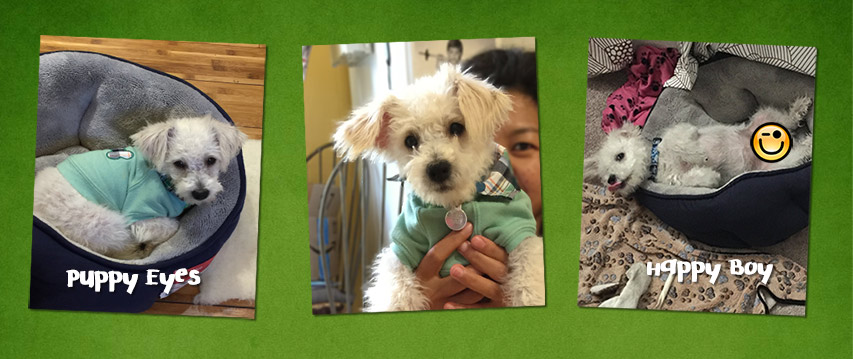Got a new puppy several months ago…
His name's Marco Polo.
The first day we noticed how much he liked to explore… and also we happened to be watching a TV series on Netflix about Marco Polo.
The name seemed to fit.
I know from experience how important it is to train a new puppy.
So I signed Marco Polo up for puppy training classes right away.
The first thing that really struck me in the first few classes was that it's not so much about training the dog…
It's much more about training the owner 🙂
The instructor is teaching the owner skills… These skills are to encourage and support the puppy to behave in ways that makes for a happy relationship.
Confession time… Going a bit slow. But we’re making progress.
He's a sweet little guy… it's hard to be mad at him when he gives you those “puppy eyes”.
Even when he chews through the power cable to my video lights 🙁
So why am I telling you about Marco Polo…
The whole process has a lot in common with learning to play guitar.
Yes… I believe I'm a better guitar teacher for having gone to puppy training.
Now there's a thought!
I want to share some of the lessons I’ve learned going through this process. Of course some of the most powerful lessons are reminders of things I already knew.
But training Marco really opened my eyes… and my heart.
Here are six “puppy training” lessons that will help you to be a better guitar student, and therefore better guitar player…
Praise Works Better Than Criticism
PUPPY TRAINING: I found it more natural than I wanted to believe to scold Marco when he didn't do what I wanted… especially at first when it look kinda hopeless. Of course I was getting frustrated, and felt more than a little helpless. It showed in the way I expressed myself to him.
As time went on I changed my approach to him. I praised even the little successes much more often (and gave him treats). Instead of scolding I ignored unwanted behaviors, unless it was dangerous like running in the street.
I found Marco looked forward to his walks and training sessions (might be the treats). He also seemed to, little by little, want to do what I considered good behavior. All in all the training became more fun for both of us.
GUITAR LESSON: It's important for guitar teachers to look for opportunities to recognize small successes. But even more important is for students (and I include myself in this) to watch their mental self talk.
Do you criticize yourself every time you make a mistake (otherwise known as unwanted behavior). Do you acknowledge yourself when you're making improvements… even the small ones?
I've always operated from a somewhat un-challenge belief that to be really good at something I have to be tough on myself. I'm rethinking that now as I see how much faster Marco is making progress and how much more fun we’re both having.
Don't Base Progress on Any One Day
PUPPY TRAINING: I know this sounds like the “duh” kind of obvious thing. But stay with me for a minute. It wasn't hard for me to see that Marco couldn't get everything in the first few sessions. In fact some days he seemed to get it, and others he forgot what we did previously.
The instructor kept reminding the class that it’s natural. On some days the puppy will do better and on other days worse, depending on a lot of factors. But by working on it every day he will get better over time.
GUITAR LESSON: Even though this sounds obvious, I find myself and many students feel discouraged when things don't seem to get better every day.
Can you relate?
The tendency is to get discouraged and practice less.
A better approach is to keep at it a little at a time. Look at progress as a long-term thing and try not to get discouraged with short-term expectations of progress.
Don't Let Too Much Time Lapse Between Sessions
PUPPY TRAINING: Like everybody… I'm busy. Even though the instructor encouraged us to do a little every day, sometimes I skipped several days.
When I did I could see Marco had a hard time remembering what we did in the previous session. It was a little like two steps forward and one step back.
GUITAR LESSON: It's important in the early stages not to let more than 24 hours lapse between practice sessions. The skills are just starting to become habits. Just like a puppy your mind and body will quickly revert back to untrained behavior.Break Learning Into Small Steps
PUPPY TRAINING: Teaching the puppy works much better when you break down each of the behaviors into small steps. Work on the small step so that it's fairly consistent. Then add another small step.
As an example… I wanted to teach Marco not to run out the door every time someone opened it (especially dangerous since he still thinks cars are magical beings to be chased).
First… I worked with him on “watch me”. I point with two fingers to my eyes. This is to get his attention. Next, when I consistently got him to respond when I said “watch me”, I begin working on “sit”. That's because it's much easier to have the puppy “stay” a sitting position than if he still standing.
The third step was “stay”. That seemed to come quicker after I could get his attention and have him sit. It was a fairly short step from there to teach him to sit and stay when I open the front door. Now he'll wait for me to say “okay” before he runs out (with his leash on).
GUITAR LESSON: Every student I've met, left to themselves, would try to make leaps that are too big and likely to lead to tension and frustration. This is where a good teacher or system comes in handy.
It's important to break down learning steps into small pieces. Practice each step until you can do it fairly consistently. I use what I call the 80% rule. It's just a judgment call. Practice until you can do it to about 80% of what you consider perfect. This helps you to achieve the balance of not moving on too quickly (which leads to overwhelm) with the “perfection trap”… never moving on because nothing is ever perfect.
This is important for two reasons…
The first is that when you try to make leaps that are too big it tends to lead to bad habits and a lot of tension. Tension itself becomes a habit which is hard to break. By moving in small steps it's easier to relax and do it properly.
The second is to reduce frustration. There's no way of eliminating frustration completely, but by reducing it you help avoid associating practicing with a negative experience and becoming discouraged.
Learn in the Proper Order
PUPPY TRAINING: Teaching Marco to sit before getting his attention is very unlikely to work. Teaching him to stay at the door before sitting is just too hard for a young puppy.
It was more clear to me than it has ever been… it’s critical to break things down to small steps, and then follow the steps in the proper sequence. This is at the core of having a successful experience training a puppy.
GUITAR LESSON: I’ve seen many students, especially ones who have been teaching themselves, suffer from “learning out of the proper sequence” syndrome. Sometime it's subtle, but often it's really obvious… At least to me.
I call it the “Swiss cheese” approach. They can play some of the beginner material.
Often they show me some things that are a little more in the intermediate range, and even some songs or techniques that are more difficult.
Unfortunately they tend not to play any of it very well… and have clearly developed some bad habits and a lot of tension.
These students benefit most by going back and working on the foundation material. First we’d fill in some of the holes in their “swiss cheese”… the techniques or knowledge that they missed from the early stages. This usually helps them make better use of the things they already know.
Then we move forward step-by-step, keeping an eye on good habits and proper technique.
Be Persistent… Keep Coming Back
PUPPY TRAINING: When I first started training Marco I felt pretty helpless. Just trying to get his attention seemed almost impossible. Finally, he looked at me just for a second when I said “watch me”. I quickly pulled out a treat and let him know he did great. But my enthusiasm was short-lived because it couldn’t seem to get him to repeat it.
Alas… Little by little it got better. First every third or fourth time, then every other time, and now every time I say “watch me” he looks right at me.
If I had given up after three or four, or 10 times… I'd be dead in the water.
But now Marco can do many of the things that looked nearly hopeless when we first started.
Persistence paid off!
GUITAR LESSON: When I first started playing guitar I actually thought the guitar players I'd seen on stage were somehow born different.
I imagined that they had some unique gift that everyone could tell when they were little. Sure they had to learn some things and practice, but it was clear they had “the touch”.
And then there was me.
I had to work at it. And then work at it some more. I didn't even think I could be “as good” as some of my friends, never mind the guitar gods that I idled.
But I kept at it…
Now… I get emails from people telling me how much my music has touched them.
When I play concerts I often get asked (usually by a teenager or young adult) how they could learn to play like that.
Inside I'm smiling a little bit.
You see… I know I wasn't born special… or with some unique gift. I just had the desire to express myself with music, and a willingness to just keep coming back at it.
I’m smiling because I know they are looking for some mystical piece of advice.
Nothing as plain and simple as “just keep practicing”. Of course… I’d advise them to take lessons from a competent teacher, watch instruction videos, listen to advice from experienced players… but mostly practice some more.
You fall off the horse, and then you just get back on. Over and over.
Really… just that simple.
Is it possible to get the best of organized systematic lessons with the feedback and accountability of a private teacher, BUT at an affordable price?
Learn more about Real Guitar Success.
Tell Us What You Think – Please Comment Below!
We would love to hear your comments and questions. What specific things are you struggling with while learning guitar?

